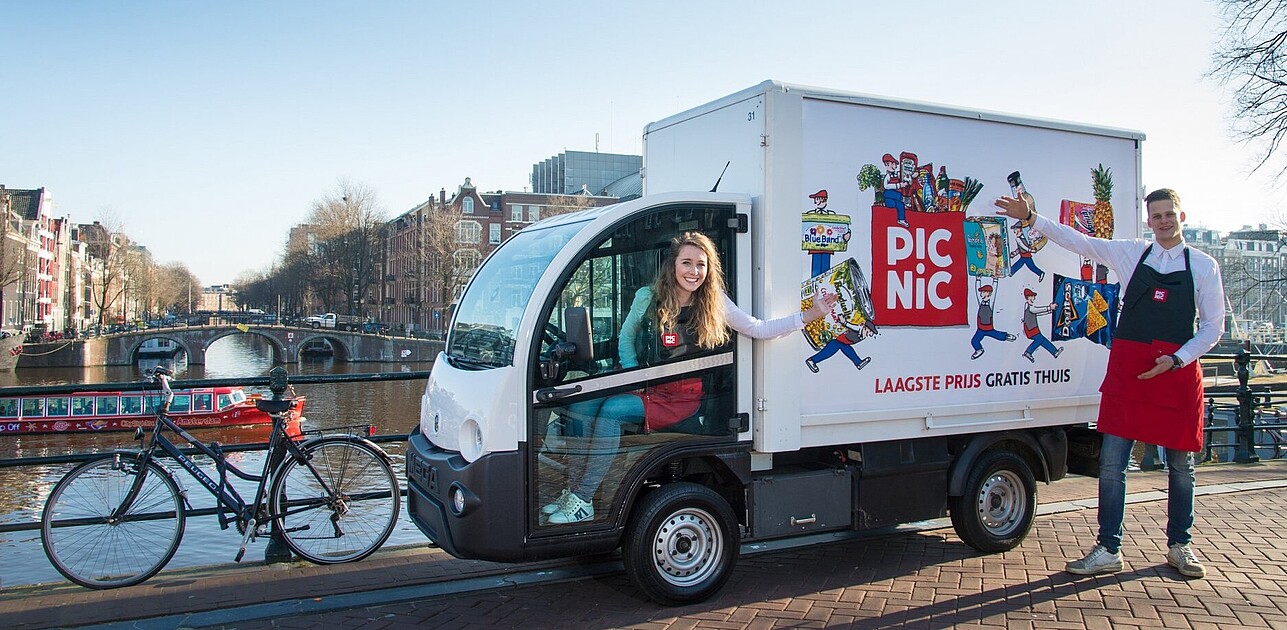

Article: Tuesday, 18 June 2024
Today, it’s easier than ever to order groceries online. For online supermarkets, however, delivering (mostly fresh) products is a complex puzzle and often unprofitable. Niels Agatz, Professor of Last-mile of supply chain at Rotterdam School of Management, Erasmus University explores how this can be improved. “Shopping online is much more efficient than having everyone drive to the supermarket in their own cars.”
While so-called ‘flash delivery’ services saw a rapid rise during the COVID pandemic, these parties do not seem to be here to stay. Both Gorillas and Getir recently announced their departure from the Netherlands. For the professor, this came as no surprise. “The combination of high logistical costs and relatively low prices means it’s very difficult to make this model profitable”, he says. Yet online supermarkets continue to expand their operations, as does Picnic, the fast-growing company founded by EUR alumnus Michiel Muller.
At Agatz's house, delivery vans from various online supermarkets come by twice a week and the professor is a big fan: “My family really make a sport of avoiding any trips to the supermarket. But when we’re on holiday, we do go – and my children just look around in amazement", he says, laughing. According to the researcher, the assumption that online shopping is bad for the environment is wrong: “People often assume it can’t be sustainable because of all the vans and their emissions. But it is much more efficient than having everyone drive to the supermarket in their own cars. And it also offers people with mobility problems a way to do their shopping.”
As the name of his chair suggests, the professor’s work deals with the final ‘link’ in the distribution chain. That link is the most complex and costly part, which is why online supermarkets are struggling to become profitable. Every household is a potential stop and you are at the mercy of customers’ whims. “Those customers aren’t always at home and want to be able to determine exactly when their groceries arrive at their door”, the professor explains. On top of that, there are often products that need to be refrigerated, so you can’t just leave the groceries at a nearby parcel point.”
His PhD research focused on optimising the distribution chain of Albert Heijn, a major player in the Netherlands when it comes to delivering groceries to customers’ homes. And he is still working on that same puzzle today. An important part of this is steering consumer behaviour to make the chain more efficient and therefore more sustainable. Where previously the customer placed an order which was then scheduled, there is now much more scope for interaction. “We are looking at whether it’s possible to ‘nudge’ customers, for example by rewarding them if they choose a wider time slot. There is still a lot of untapped potential here”, he explains.
For instance, the researcher uses machine learning to determine which window or windows should be offered to a customer. This offers you a way to steer customers in a given neighbourhood toward choosing the same time slot. But experimenting with price, time windows and other nudges also means there are more and more potential variables to play with. Agatz: "As a result, models are becoming increasingly complex and calculating the theoretical optimum can take weeks, but you don't want to keep customers waiting. So you look for a good compromise – a calculation that is less accurate but allows the customer to quickly complete their grocery order.”
Professor Niels Agatz thinks the efficiency and sustainability of last-mile delivery can be enhanced through these three strategies:
Nudging customers to choose wider delivery time slots through incentives improves efficiency and sustainability.
Collaboration with supermarkets and planning software companies results in fewer unnecessary kilometers traveled by delivery vans, reduced stock needs, and minimized food waste.
Drones are expected to remain a niche solution for deliveries, with delivery vans continuing to be the primary mode of transportation and AI allowing for smarter scheduling and improved customer interaction.
The research may be complex, but Agatz likes the fact that the outcomes themselves are quite tangible. Optimising the chain means that vans have to travel fewer unnecessary kilometres, but it also means less stock is needed and therefore helps reduce food waste. The researcher collaborates with several supermarkets, as well as companies that develop planning software. "Solving theoretical mathematical puzzles can be fun and useful. But personally, I take more satisfaction from solving the issue that underlies a real problem. I prefer to be inspired by real-life problems in my research. In that regard, the collaboration with companies often yields more new insights than when we just sit in our ivory tower trying to figure out what the problem is.”
One of Agatz’s most cited papers is about using drones to deliver packages. “The science fiction aspect appeals to people and drone stories always do well, I’ve noticed.” Yet he himself does not expect drone delivery to be the norm in 10 years’ time. The professor expects that drones will remain a small niche, which means there will still be plenty of delivery vans on the streets: “Hopefully by then we will all have zero-emission vehicles. And I think customer interaction is getting smarter as well. Soon, it will be possible to simply give the delivery service access to your calendar and even your car can become a parcel point. The customer's AI assistant will ‘talk’ to the webshop’s AI to negotiate a suitable delivery time.”


Science Communication and Media Officer
Rotterdam School of Management, Erasmus University (RSM) is one of Europe’s top-ranked business schools. RSM provides ground-breaking research and education furthering excellence in all aspects of management and is based in the international port city of Rotterdam – a vital nexus of business, logistics and trade. RSM’s primary focus is on developing business leaders with international careers who can become a force for positive change by carrying their innovative mindset into a sustainable future. Our first-class range of bachelor, master, MBA, PhD and executive programmes encourage them to become to become critical, creative, caring and collaborative thinkers and doers.
